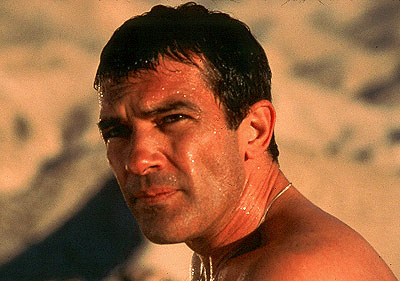

Somewhere within the huge Gordian knot that is The Body are frayed edges of potentially riveting stories. It starts well, then degenerates into hokiness. The Body, adapted by writer/director Jonas McCord from the novel by Richard Ben Sapir, begins with the discovery of the skeleton of a crucified man in a tomb in modern Jerusalem. Israeli archaeologist Sharon Golban (Olivia Williams, Rushmore, The Sixth Sense) is baffled, because only the lower classes were crucified. Anybody with a tomb would be from a higher class, and the only recorded incident of a crucified man buried in a tomb was that of Christ. They find a coin from around the time of Christ in the tomb. As Golban investigates further, the evidence that the body may indeed be that of Christ increases. The Vatican sends Father Matt Gutierrez (Antonio Banderas, Spy Kids, Play it to the Bone) to investigate and bring back a definitive answer.
At this point, the film can go in a couple of directions. It can explore the feelings of doubt within Gutierrez, now that there is a possibility that the faith he believes in may be false. It can explore this effect on a wider level, with the Christian community coming to grips with this potential bombshell. The Body can also use this discovery to illustrate the fragility of Arab-Israeli tensions in Jerusalem, or it can take Golban on her own journey of spiritual awakening. If done correctly, any one of these stories would make a fascinating movie or character study. McCord opts to roll them all into one, with the end of the movie turning into a bad action movie that does not fit in any way with the rest of the movie.
The best elements involve the Gutierrez character. As a priest, Banderas does okay for the first two-thirds of the movie. Then, when the whole movie takes a turn for the worse, his acting follows. He does have a crisis of faith, but it happens late and does not last long. A better character is Dr. Pierre Lavelle (Derek Jacobi, Up at the Villa, Gladiator). He is a priest and an archaeologist, and suffers a monumental lapse in faith. He probably swings too far the other direction, and Jacobi really hams up his performance. McCord does not explore much of what Lavelle is thinking, which is unfortunate because this is where the potential drama is. Lavelle is both a scientist and a priest, faced with scientific evidence that seems to contradict his faith. It is this dilemma that is at the heart of the beginning of The Body. Instead, McCord gives us Gutierrez, an ex-military intelligence officer from Latin America turned priest (stop laughing). Gutierrez is not an archaeologist, and the person who sends him to Jerusalem tells him forcefully to refute the claim about the bones. Gutierrez is essentially a pawn, and although he realizes this, he does his best. Golban has a right to be mad about Gutierrez's assignment, but she seems to want to do little more than taunt him.
As Golban and Gutierrez's investigation continues, any semblance of intelligence slowly fades away from the script. A convoluted story involving a three-way power struggle between the Jewish government, the Vatican, and a Palestinian extremist group emerges. It never emerges fully, because the story never becomes fully comprehensible. McCord also manages to throw in some Orthodox Jews, a priest who is also a computer whiz, and the stereotypically harried local shopkeeper. The Body unconvincingly shifts into the realm of bad action movie near the end, when the two of the groups openly vie for power complete with car chases, gunfights, and big explosions. The actions of Gutierrez at the end are also baffling. His response to the outcome of the mystery is strange, as is Lavelles. At the end of the movies, these characters are all different, but there is no good reason given for their change.